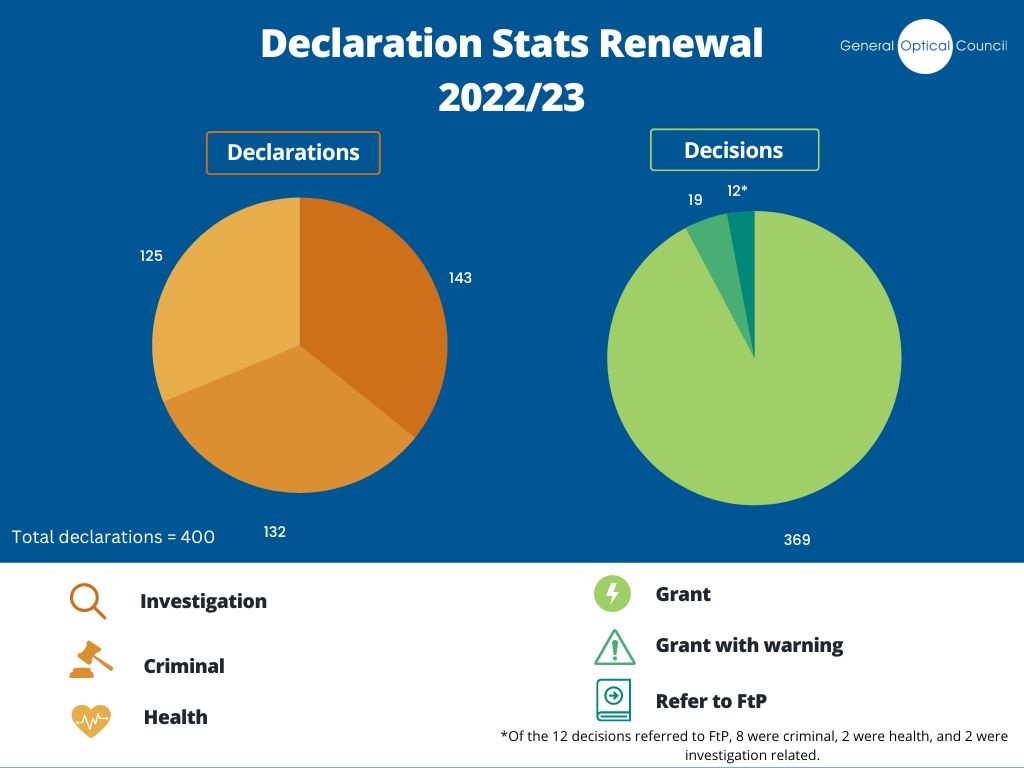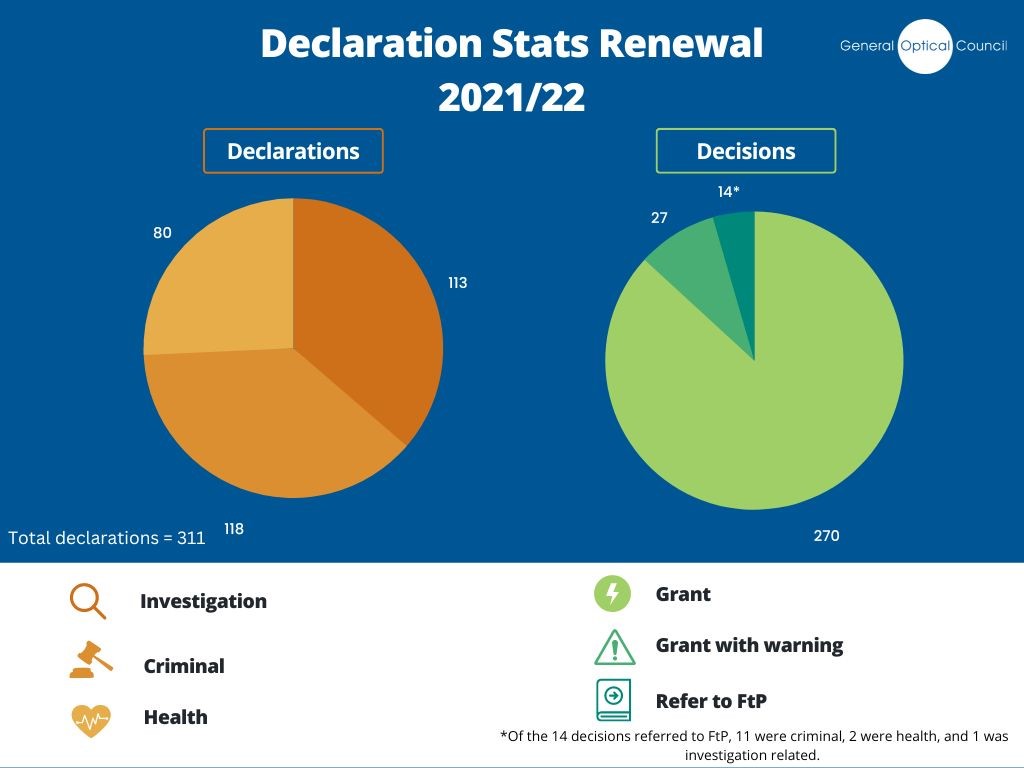- Home
- Raising concerns
- FtP Focus
- FtP Focus: the importance of registration (Spring 2023)
FtP Focus: the importance of registration
'FtP Focus: the importance of registration' was emailed to registrants on 18 May 2023. The copy as it appeared in the e-bulletin is below:
Hello, and a very warm welcome back to FtP FOCUS.
In our first five issues, we took you through the end-to-end fitness to practise function, including triage, investigations, case examiners, the journey to a fitness to practise hearing and then the hearing itself.
We also shared with you interviews with some of our staff and stakeholders, including the Optical Consumer Complaints Service (OCCS), and some case studies and statistics to help demystify the FtP process and share learnings from some of the concerns that have been raised with us.
This year, along with regular lessons from fitness to practise cases, we will introduce you to the other key functions that enable the General Optical Council (GOC) to fulfil our statutory responsibilities.
The GOC has four statutory functions:
- Setting standards for the performance and conduct of our registrants;
- Approving qualifications leading to registration;
- Maintaining a register of individuals who are fit to practise or train as optometrists or dispensing opticians, and bodies corporate who are fit to carry on business; and
- Investigating and acting where a registrant’s fitness to practise, to train or to carry on business may be impaired.
In this issue, we have an FtP FOCUS on our registration function and how it relates to FtP.
It’s a real privilege to be part of a professional regulator and I hope that you’ll find the information about your registration insightful and useful.
Please do share your thoughts or feedback on this issue or what you might like to see more of by emailing me at focus@optical.org.
All the best,
Dionne Spence
Director of Regulatory Operations
Registration: why it’s important
As a regulator, our purpose is to protect the public. One of the ways we do this is by maintaining a register of optometrists, dispensing opticians, student optometrists and dispensing opticians, specialty practitioners and bodies corporate conducting business in optometry or dispensing optics in the UK.
Our register is available to search on our website so that patients can ensure that the optical professional providing their eyecare is registered with us. The register will display various pieces of information about the registrant, including their name, GOC registration number, their profession including approved specialties, and may include any FtP decisions.
When applying to join, renew or restore to the GOC register, there is a professional duty to declare any criminal convictions or disciplinary action, including that from another regulator or physical/mental health issues which may affect your fitness to practise.
Failure to make a declaration may lead to a registrant’s fitness to practise being investigated and so it is important to read and understand our declarations guidance for more information.
When reviewing declarations, there are a few different decisions the Registration team can make:
- Grant: registration will be granted following a review of the declaration.
- Grant with a warning: registration will be granted following a review of the declaration, and the registrant will be advised to re-declare when renewing the following year.
- Refer to FtP: further investigation is needed and the declaration has been referred to our Triage team who will consider, in line with our Acceptance Criteria, whether to open an investigation.
If the team receives a declaration outside of the registration renewal period, it is referred to our Triage team for assessment.
When the Triage team receives declarations, they will first consider whether there has been a breach of the relevant standards and whether the breach amounts to an allegation under section 13D of the Opticians Act 1989, and will assess the declaration against our Acceptance Criteria.
You may recall from our first issue on triage, the Acceptance Criteria is the guidance our FtP team uses to determine whether to accept a complaint as an allegation of impaired fitness to practise. If the complaint meets the Acceptance Criteria, an investigation will be opened to determine whether the registrant’s fitness to practise is impaired.
Find out more about our triage process.
Statistics
The figures below show the declarations made in the fully qualified and body corporate renewal periods in 2022/23 and 2021/22.
Case study #1: Declaration of a criminal investigation
The Registration Team received a declaration from a registrant about a summons that had been received regarding a failure to provide the driver details to the police following a driving offence. The registrant said they had been advised that they had received points on their licence which had then been revoked and that they were appealing against the decision as they had moved house and their mail had not been correctly diverted to their address.
Shortly afterwards, the registrant told us that their case had been heard and had been withdrawn as the prosecutor did not consider that it was in the public interest to proceed. The GOC confirmed this information directly with the court.
The allegations were assessed against our Acceptance Criteria and we considered that the matter should be closed with no further action.
Section 2.4 of the Criteria states that ‘In respect of all complaints, we will first consider whether there may have been a breach of the relevant standards. If so, we will then go on to consider whether the breach would amount to an allegation under s.13D Opticians Act 1989’.
As the criminal concerns were withdrawn, we considered that there was no breach of the Standards, and therefore no allegation could be made. Additionally, we were satisfied there were no public protection or public interest concerns that arose.
Even if the registrant had been convicted, it still may have been suitable to close this case. The Acceptance Criteria defines certain categories of conviction / caution that are unlikely to amount to fitness to practise being impaired, including some motoring offences. All cases are considered independently and so it is important to declare any concerns in line with our declarations guidance.
However, like in this case study, registrants must declare any criminal convictions or cautions they have to the GOC.
Case study #2: Declaration from a student optometrist about a university investigation into falsifying records
A registrant informed the GOC that they had been reprimanded at university for falsifying patient records for a Stage 2 assessment. The matter was referred to fitness to practise and an investigation was undertaken and referred to a fitness to practise committee hearing by the Case Examiners.
On receipt of the final case, the student admitted the allegation and accepted that their fitness to practise was currently impaired.
The GOC proposed to resolve the matter through an agreed panel disposal (APD) which can be applied for in circumstances where the registrant admits all the facts, that the facts amount to misconduct and that as a result of this, they are ‘currently’ impaired. The matter can then go to the Committee for a decision on these matters, and then sanction without the need for a full hearing.
In their submissions, the registrant provided several documents highlighting their remediation and ongoing training, and shared insight into their failings and how they intend to improve in their practise.
The Committee accepted that there were no prior fitness to practise concerns and that this was an isolated incident. They also considered that the registrant was still a student and had time to learn from the experience and improve their practise, and as such the risk of repetition was low.
However, due to the element of dishonesty and the fact that the registrant had altered patient records at the time, this increased the risk of harm to patients as any optometrist reviewing those records later would be acting on incorrect information.
Therefore, the Committee issued the registrant with a 12-month suspension order with no need to review, meaning they could restart their studies as soon as the 12 months was up.
Useful links
Association of British Dispensing Opticians: ABDO are a representative membership organisation for dispensing opticians, currently representing over 6,350 qualified dispensing opticians in the UK.
ABDO College: ABDO College provides programmes leading to professional qualifications awarded by the Association of British Dispensing Opticians.
Association of Contact Lens Manufacturers: Established to publicise the work of UK manufacturers, ACLM represents over 95% of all prescription contact lens care products in the UK.
Association of Optometrists: The AOP are a representative membership organisation for optometrists, currently supporting over 82% of practising optometrists in the UK.
British Contact Lens Association: BCLA is a membership organisation that seeks to provide members with access to training and relevant information, as well as the opportunity to communicate with others involved with contact lenses, whatever their role.
The College of Optometrists: The College is the professional body for optometrists. It qualifies the profession and delivers the guidance, development and training to ensure optometrists provide the best possible care.
Federation of Ophthalmic and Dispensing Opticians: FODO is a representative membership organisation for eye care providers working in primary and community.
Optical Consumers Complaints Service: The OCCS is an independent and free mediation service for consumers (patients) of optical care and the professionals providing that care. The service is funded by the General Optical Council who regulate optometrists and dispensing opticians.
Latest news from the GOC
GOC meets all of PSA’s Standards of Good Regulation for 2021/22
The Professional Standards Authority’s report highlights the improvements we have made to the time it takes to progress cases through our fitness to practise system, noting this compares favourably to other regulators, as well as recognising the ongoing programme of work that will further positively impact timeliness.
Read more about our achievements.
Optometrist suspended for twelve months
The registrant had undertaken restricted activities despite not having met the 2016-2018 CET cycle requirements, failed to record necessary patient information, and falsified clinical data in subsequent examinations.
Dispensing optician erased for falsifying refund transactions to personal account
The registrant had also amended customers’ telephone numbers to conceal the fraudulent refunds.

